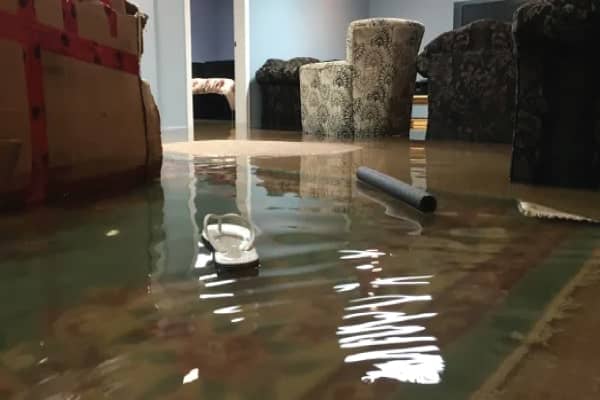It’s raining outside and you’re relaxing in the basement, you get up and notice the floors are wet. Panic sets in and what do you do?
Installing a basement waterproofing system could be your answer.
Water in the basement can lead to mold, musty smells, damaged walls, and floors, and ruined furniture and belongings. It’s necessary to get rid of the water, fix underlying basement water problems, and take steps to keep your basement dry.
Steps to take now if your basement is wet:
Priority #1: Stay safe. Standing in water while handling any electrical devices can cause shock or electrocution. If you must go down into a flooded basement, wear rubber boots and make sure you can stay dry. Don’t touch wet electrical wires or devices.
Try to determine where the water is coming from: Is your basement water problem a one-time event or do you have a consistent problem? If the problem is water seepage from foundation issues, it’s likely to keep happening if not dealt with. If the water is from a plumbing leak, contact an experienced plumber for help.
Have standing water pumped out as soon as possible. If your basement is only partially flooded, you can suck up standing water using a wet-dry vacuum. Otherwise, you’ll need to call in a restoration company to start the mitigation process. After pumping the basement, it may be necessary to run a dehumidifier and fans to help dry out the area.
Remove materials and items that might attract mold. Some materials like carpet, carpet pad, drywall, paper, fabric, wood, and leather will attract basement mold if they remain wet for more than a day or two. Dry out and save what you can; discard the rest.
Why is your basement wet?
Water seepage where the basement wall meets the floor is a common cause of water in the basement. Aside from a plumbing leak or local flooding, there are two major causes of water in the basement: surface water and subsurface groundwater.
Here are the three most common symptoms and the causes of each of these problems below.
Water coming up through the concrete basement floor
If water is coming through the basement floor or coming in where the basement walls meet the floor, then the source of the water is likely subsurface groundwater. There are a few reasons for this.
Hydrostatic pressure – Rising groundwater and saturation during wet weather causes hydrostatic pressure, which pushes against the foundation and pushes water through cracks and openings in the concrete. This pressure can also cause the basement floor and walls to crack.
Water near the exterior foundation wall or stains on the foundation wall
If the water in your basement seems to be only near the exterior foundation walls, then the problem is likely to surface water that isn’t draining away properly. There are several problems to look for around your house. A basement waterproofing system could be your answer.
Leaky basement windows or clogged window wells – Leaves and debris can clog window wells and cause them to fill with water. The water can leak into the basement through cracks and gaps around old basement windows.
Overflowing gutters – Water overflowing from the gutters can get into the basement and erode soil, which can cause foundation cracks.
Short downspouts – Downspouts should extend at least 10 feet from the house to ensure runoff is discharged far enough away from the foundation.
Landscape slope – Your yard and the soil next to the house should slope away from your foundation to keep water from pooling and saturating the soil.
Settled pavement – Pavement can crack and settle over time, which can cause rainwater to flow toward the house. A contractor can repair or replace the pavement so that it slopes away from the home.
Roof leaks – Water leaking in through the roof can run down and damage your basement ceiling or walls.
Flooded basement with water covering all or most of the basement floor
Basement flooding during wet weather is a common problem. The additional water on the surface and underground from heavy rains and melting snow can put a heavy load on drainage systems. There are many reasons why the basement might flood.
Sump pump problems – If your sump pump isn’t able to keep up or if it fails due to a mechanical problem, your basement can flood. Read about the common sump pump problems and what to do about them.
Plumbing or appliance failure – A damaged or burst pipe, cracked washing machine hose, or failed hot water tank can cause major flooding in the basement.
Exterior drainage tile failure – Exterior drainage systems are prone to clogging and other problems. If the French drain system fails or was installed incorrectly, the basement can flood, especially during heavy rains.
Storm sewer backup – During heavy rains, the municipal storm sewer system can become overwhelmed with water. When the water level gets too high, water can back up in the system and into your basement.
How to prevent a wet basement
Whether you have a puddle or a basement filled with water, any water in the basement can cause expensive damage. An effective basement waterproofing system can help prevent water damage. Here are some improvements you can make to help keep your basement dry:
Improve outside drainage. If water pools near the foundation during a storm, clean your gutters to prevent overflow, add downspout extensions so gutters drain away from the foundation, and make sure the soil around the foundation is properly sloped away from the house.
Install or replace sump pump. A cast-iron Zoeller sump pump can provide reliable protection against basement flooding. Consider installing a Zoeller battery-powered backup pump in case the power goes out.
Add interior drainage. An interior drainage system can effectively solve a chronic basement water problem. Basement Drainage System is a hidden interior drain that captures water before it reaches the basement floor. The water is piped to a sump pump that automatically discharges the water outside your house.
Protect against plumbing leaks. Replace an old tank-type water heater before the interior rusts out and causes a major basement flood. Replace rubber washing machine supply hoses if they show signs of cracking. Check water supply and drain lines for leaks and take steps during cold weather to prevent water lines from freezing and bursting.
Install new egress windows and windows well covers. Cleaning window wells can prevent them from clogging with leaves and other debris. You might also consider adding a window well cover and replacing old, leaky basement windows. These upgrades will do more than prevent water leaks; they’ll also make your basement more attractive and energy efficient.
Repair foundation cracks. Horizontal, vertical, and stair-step cracks in the foundation walls are caused by changes in the soil around the foundation or construction defects. A foundation repair expert can inspect the cracks to determine the cause and whether repair is needed.
Check the roof for damage. Look for worn or missing shingles and other signs of damage that may lead to a roof leak.
Call the Basement Waterproofing Experts
Allow the basement waterproofing system experts at BAM Basements and Masons to help you. We are one of the most sought-after names when it comes to basement waterproofing in and around Des Moines. Our team has many years of experience and in-depth knowledge about keeping the basement free from moisture and humidity. Therefore, we can suggest the right method for your home.
All our basement waterproofing techniques come at bargain basement pricing, and we ensure the timely completion of each of the projects. To know more about basement waterproofing and get a free estimate, please feel free to call us!


